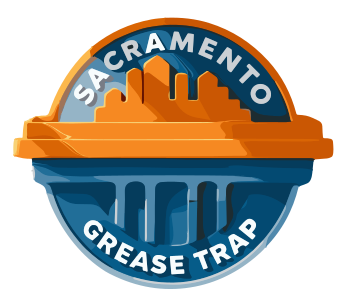Grease Trap Pumping Sacramento | Expert Guide & Tips
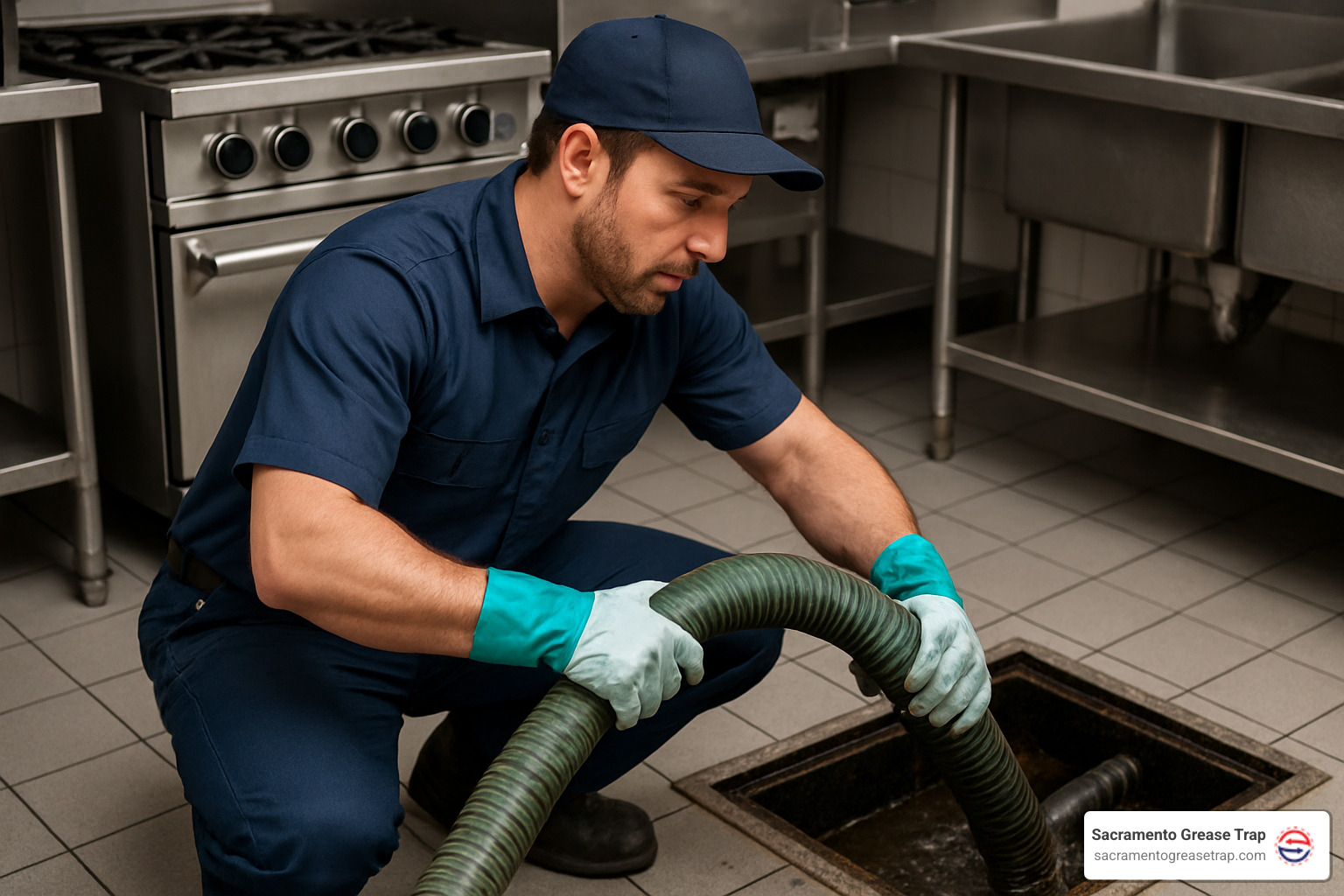
Why Sacramento Restaurants Can't Ignore Grease Trap Maintenance
Grease trap pumping sacramento services are essential for any commercial kitchen to prevent costly backups, avoid hefty fines, and keep your business running smoothly. Here's what you need to know:
Quick Answer for Sacramento Business Owners:- Frequency: Every 1-3 months (or when grease reaches 25% capacity)- Cost: Starting around $175 for basic service- Legal Requirement: Yes - Sacramento County requires regular maintenance- Consequences of Skipping: Fines, plumbing disasters, potential closure- Best Practice: Schedule preventive service rather than waiting for problems
If you own a restaurant, hotel, or any commercial kitchen in Sacramento, you've probably found that grease traps need regular attention. As one local service provider notes: "If you own a restaurant or commercial business that has a grease trap, you probably know that it needs to be pumped and maintained on a regular basis."
The reality is simple but critical: fats, oils, and grease (F.O.G.) are the leading cause of sewer blockages in Sacramento. When grease hardens in your pipes or the city's sewer system, it creates expensive problems for everyone involved.
Sacramento's food scene is thriving, but with over 7,000 grease traps requiring regular maintenance across the region, staying compliant isn't optional. The Sacramento Area Sewer District has clear rules about keeping F.O.G. out of the system, and violations can shut down your kitchen faster than a health inspection.
The good news? Regular pumping prevents disasters, protects the environment, and actually saves money compared to emergency repairs and fines.
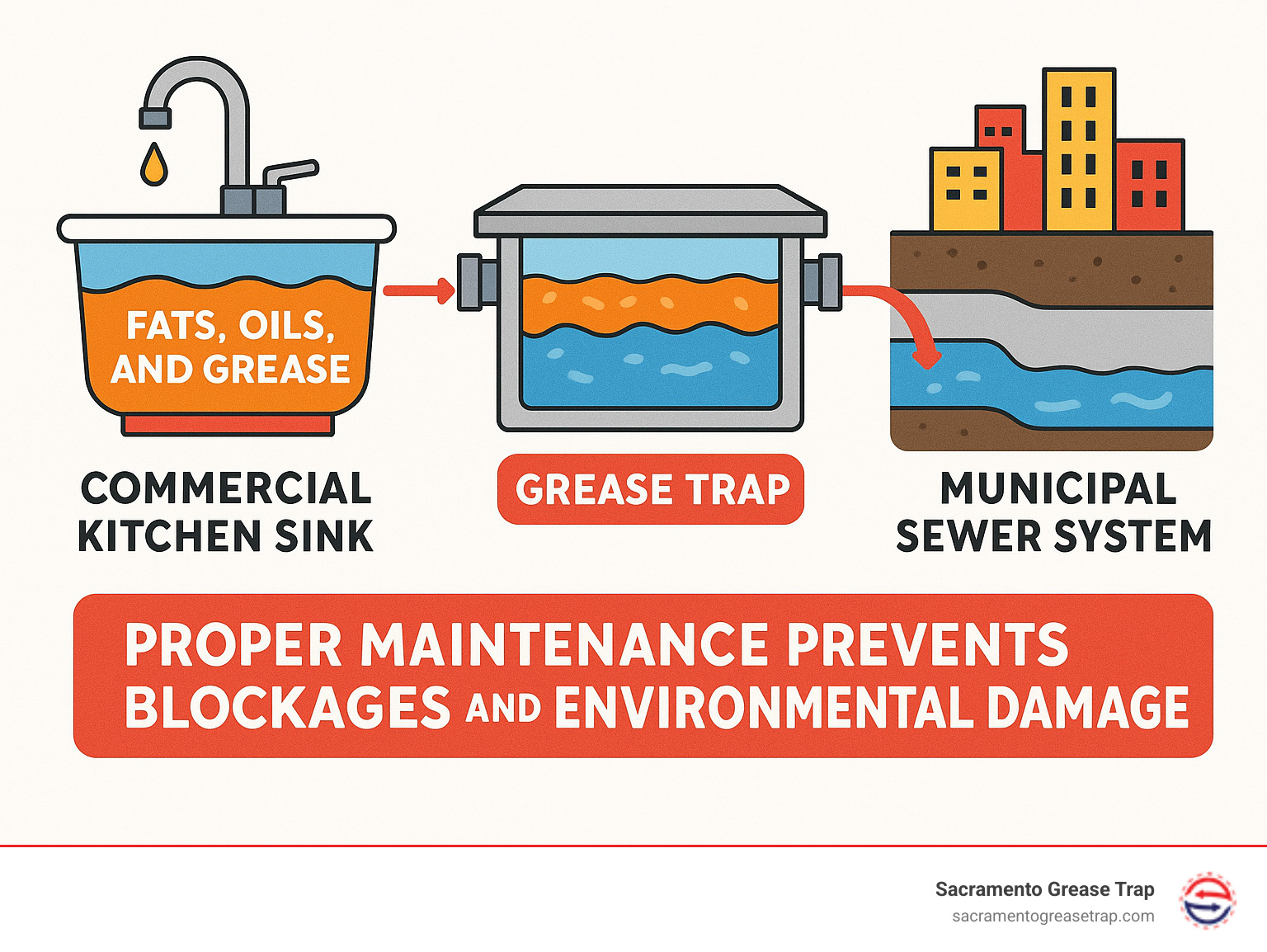
Grease Trap 101: What They Are & Why Sacramento Kitchens Need Them
Your grease trap might be the hardest-working piece of equipment in your kitchen that you barely think about. These devices act like silent guardians, quietly separating fats, oils, and grease from your wastewater before it can cause havoc downstream.
Every day, Sacramento's busy restaurant scene produces thousands of gallons of greasy wastewater. Without grease interceptors doing their job, all that F.O.G. would flow straight into our city's sewer system. Once there, it cools down, hardens, and creates stubborn blockages that can back up into streets, neighboring businesses, and even homes.
The environmental impact goes beyond just plumbing headaches. When sewer systems overflow due to grease blockages, contaminated water can reach the Sacramento River and other local waterways. That's why these devices aren't just good business sense - they're essential for environmental stewardship and keeping our community's plumbing health intact.
How a Grease Trap Works Inside Your Restaurant
The beauty of grease traps lies in their simplicity. When wastewater flows from your dish pit and prep sinks, it enters through the inlet pipe and immediately slows down inside the trap. This gives physics time to work its magic.
Here's where the separation science gets interesting. Grease naturally floats because it's lighter than water, while heavier food particles sink to the bottom. The trap creates three distinct layers: grease on top, clean water in the middle, and solids at the bottom.
The clean water exits through an outlet pipe positioned in that middle layer, leaving the unwanted stuff trapped inside. When everything works properly, your trap can capture up to 90% of the grease trying to escape your kitchen.
But here's the crucial part: the 25% rule. Once the combined grease and solids reach 25% of your trap's total capacity, it's time for grease trap pumping sacramento service.
Common Trap & Interceptor Types Used in the Capital City
Sacramento kitchens use different types of grease management systems depending on their size, volume, and specific needs.
Under-sink traps are the compact workhorses you'll find tucked beneath dish sinks in smaller establishments. These units work beautifully for cafes, small restaurants, and businesses that don't generate massive amounts of grease. The trade-off? They fill up faster and typically need pumping every 3-6 weeks.
For high-volume operations like large restaurants, hotels, and institutional kitchens, in-ground interceptors are the heavy-duty solution. These larger systems get buried outside your building and can handle serious grease loads.
The newest option gaining popularity in Sacramento is automatic removal units. These high-tech systems use mechanical components to continuously remove accumulated grease, reducing how often you need pumping service.
Grease Trap Pumping Sacramento Regulations, Frequency & Penalties
Running a commercial kitchen in Sacramento means playing by the rules - and when it comes to grease traps, those rules are serious. The Sacramento Area Sewer District has established comprehensive Best Management Practices that aren't just suggestions; they're requirements that every food service establishment must follow.
Sacramento County Code 4.14 exists because grease in the sewer system creates blockages that can back up entire neighborhoods, contaminate waterways, and create public health emergencies. Health inspectors take grease trap maintenance seriously during their visits, checking maintenance logs and asking pointed questions about your pumping schedule.
How Often Is Grease Trap Pumping Sacramento Kitchens Required?
The 90-day minimum rule applies to most commercial kitchens - even low-volume operations can't go longer than three months without pumping. High-volume operations like busy restaurants and hotels typically follow the 30-day rule, scheduling monthly service to stay ahead of problems.
The real trigger isn't the calendar, though - it's the 25% capacity rule. When fats, oils, grease, and solids reach a quarter of your trap's total volume, it's time for pumping regardless of when you last had service.
Inspection logs are your best friend here. Every pumping service should be documented with dates, measurements, and disposal receipts. During health inspections, these logs prove you're staying compliant.
What Happens If You Skip Grease Trap Pumping Sacramento?
Skipping grease trap maintenance is like ignoring that weird noise your car makes. You might get away with it for a while, but when things go wrong, they go really wrong.
Plumbing backups are usually the first disaster. Picture this: you're in the middle of dinner rush when greasy sewage starts backing up through your floor drains. The smell alone will clear out customers, but the health department closure order that follows will keep them away much longer.
Emergency closures happen fast when inspectors find overflowing traps or contaminated areas. Once they post that closure notice, you're shut down until everything's cleaned, pumped, and re-inspected.
Civil penalties add financial pain to operational chaos. Sacramento can impose fines ranging from hundreds to thousands of dollars, depending on violation severity and repeat offenses.
The environmental damage aspect creates long-term liability. When overflowing grease contributes to sewer blockages or waterway contamination, cleanup costs can reach tens of thousands of dollars. The Customer Maintenance Tips from Sacramento Area Sewer District make it clear: prevention costs pennies compared to remediation.
Regular grease trap pumping sacramento service costs a few hundred dollars every few months, while emergency repairs, fines, and lost revenue can cost thousands in a single incident.
For more detailed guidance on timing your service, check out our grease trap pumping frequency guide to help you stay ahead of problems.
From Booking to Disposal: The Professional Pumping & Cleaning Process
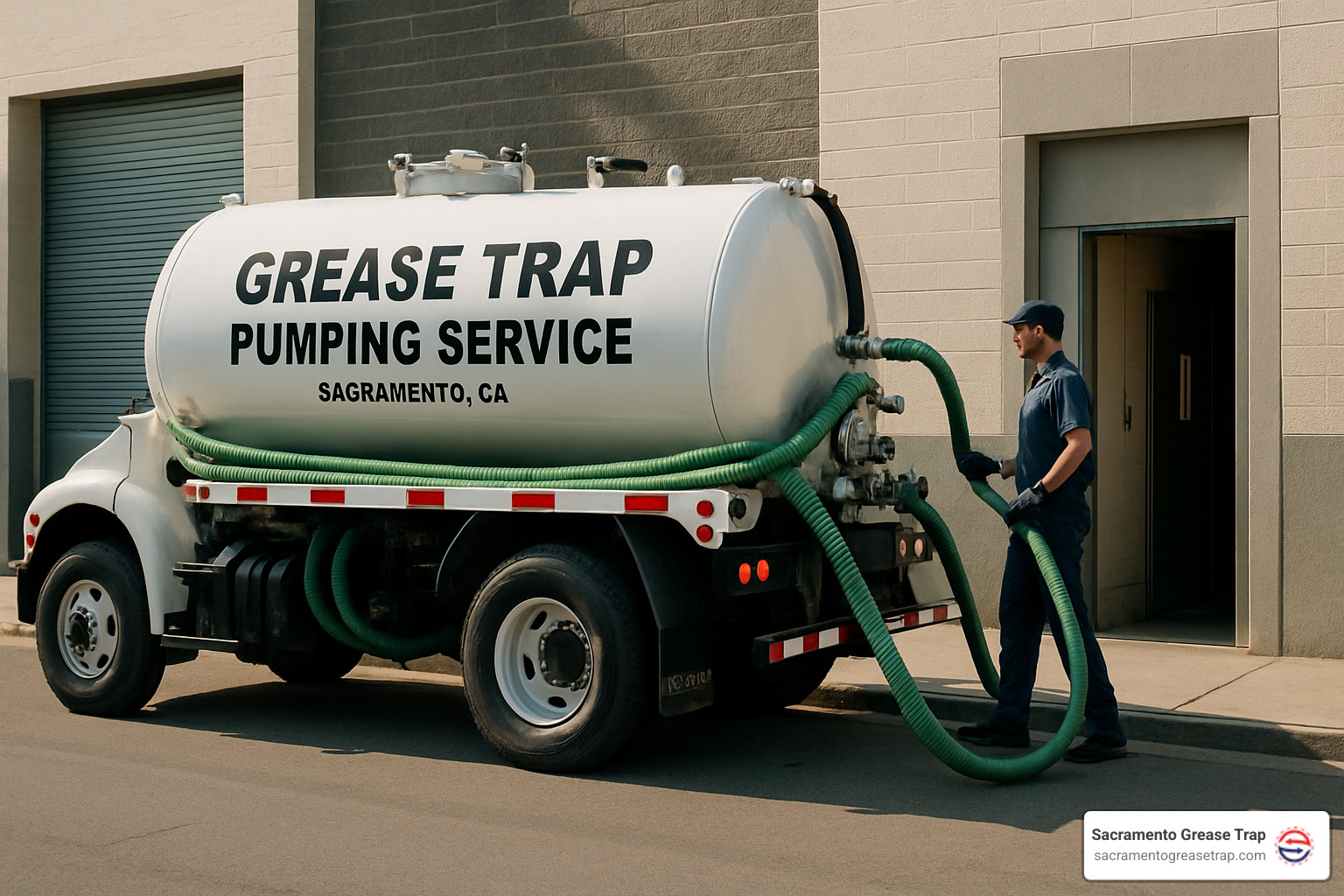
When you call to schedule grease trap pumping sacramento service, you're setting in motion a carefully orchestrated process that protects your business and the environment. Our specialized service trucks arrive equipped with powerful vacuum systems designed specifically for handling grease trap waste.
First, we take precise measurements of your F.O.G. levels. These measurements become part of your official compliance record and help us determine exactly what needs to be done.
Next comes complete evacuation. We don't just skim the surface - our equipment removes 100% of the liquid waste and solid debris from your trap. This thorough approach means your trap functions like new after we're done.
The real difference comes in our scraping and wash-down process. We scrape every surface clean, then wash down the entire interior. For traps that haven't been properly maintained, we bring out hydro-jetting equipment - high-pressure water systems that blast away even the most stubborn accumulations.
Before we leave, we complete all the manifest paperwork documenting proper disposal at licensed facilities. This paperwork is your protection during inspections and proof that you're doing things right.
| DIY Attempts | Professional Service |
|---|---|
| Surface skimming only | Complete evacuation |
| No proper disposal | Licensed facility disposal |
| Missing documentation | Full compliance records |
| Potential safety hazards | Trained, insured technicians |
| Often incomplete cleaning | Thorough scraping and washing |
Typical Costs & Size Factors in Sacramento
Basic service for small under-sink traps typically starts around $175, while larger in-ground interceptors range from $300 to $450 per service.
Trap size is the biggest factor affecting your cost. A 1,000-gallon interceptor takes more time, equipment capacity, and disposal fees than a 50-gallon under-sink unit.
Pumping frequency also impacts pricing. Customers who stick to regular maintenance schedules often get better rates than those calling for emergency service.
Extra Services Most Providers Bundle
Line jetting is one of our most popular add-ons because it clears the pipes connecting your trap to the main sewer line, preventing backups between pumpings.
Video inspection spots cracks, blockages, or structural issues before they turn into expensive emergencies.
Cooking oil recycling actually puts money back in your pocket while helping the environment. Instead of paying disposal fees, many clients earn revenue by selling their used cooking oil to companies that convert it into biodiesel.
Minor repairs during regular service calls save you from scheduling separate repair visits and keep small problems from becoming big ones.
For complete details about how these bundled services can benefit your operation, check out our comprehensive services page.
Keeping Grease Out of the Sewer Between Pumpings
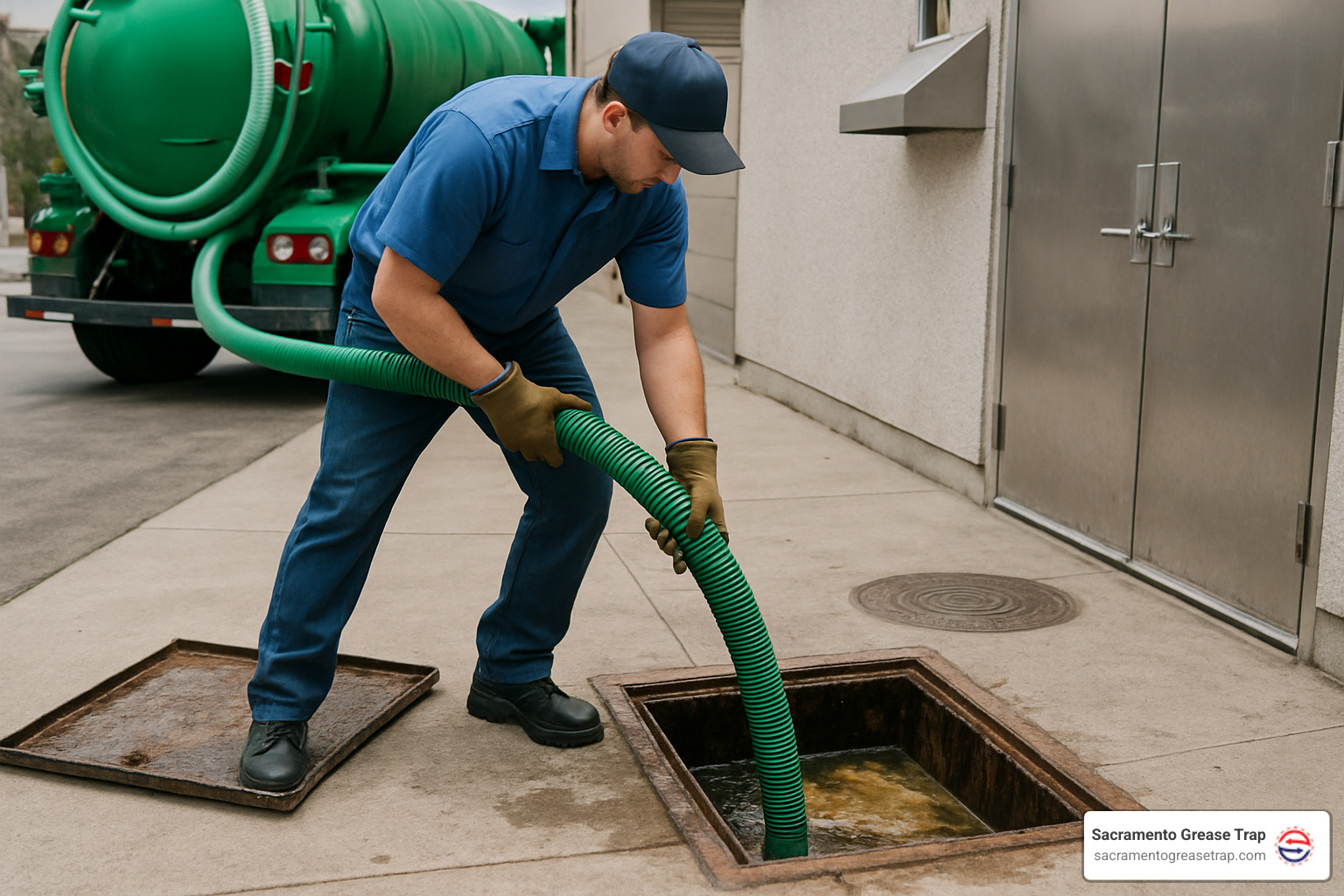
The secret to extending your grease trap pumping sacramento intervals isn't complicated - it's all about what happens in your kitchen every single day. Every drop of grease you keep out of the drain is money saved on pumping costs and compliance headaches avoided.
We've trained hundreds of Sacramento restaurant teams on the "can it, scrape it" method, and it's surprisingly simple. Let grease cool and harden, then scrape it into trash containers instead of washing it down the drain. One busy downtown restaurant cut their pumping frequency in half just by implementing this practice consistently.
Staff training transforms your entire operation. When everyone from dishwashers to managers understands how their daily actions affect the grease trap, magic happens. We teach teams to scrape plates thoroughly before washing, use sink strainers religiously, and treat liquid grease like toxic waste.
Oil bins for used cooking oil are game-changers. Instead of overwhelming your grease trap with gallons of fryer oil, collect it separately. Many Sacramento businesses actually earn money by partnering with recyclers who convert used oil into biodiesel.
Here's where we get realistic about enzyme additives: they can help break down organic matter, but they're not miracle workers. Despite what some salespeople claim, no additive eliminates the need for regular pumping in commercial kitchens. Think of enzymes as helpful supplements, not replacements for proper maintenance.
Best Practices for Safe F.O.G. Disposal
Smart F.O.G. disposal starts with sealed containers for cooled grease. Old coffee cans work fine, or invest in dedicated grease containers - just keep everything sealed and separate from other waste.
Partner recyclers have revolutionized how Sacramento restaurants handle waste cooking oil. These companies often pay better rates than disposal services while supporting our city's sustainability goals.
Compost programs handle food scraps much better than your grease trap ever could. Sacramento's zero-waste initiatives make organic waste diversion both environmentally smart and often cheaper than traditional garbage disposal.
Simple Daily & Weekly Trap Maintenance Hacks
Visual inspections take two minutes but prevent thousand-dollar disasters. Check for unusual odors, visible grease buildup, or slow draining during your daily walk-through. Our guide on Signs Your Grease Trap Needs Pumping teaches you exactly what to look for.
Weekly skimming of surface grease extends time between professional cleanings significantly. Use a long-handled ladle or skimmer to remove floating grease, but resist the urge to go deeper.
Log sheets create accountability and provide inspector-ready documentation. Record daily observations, weekly maintenance, and any unusual incidents.
Odor checks protect your customer experience and signal potential problems. A properly maintained grease trap shouldn't create dining room odors.
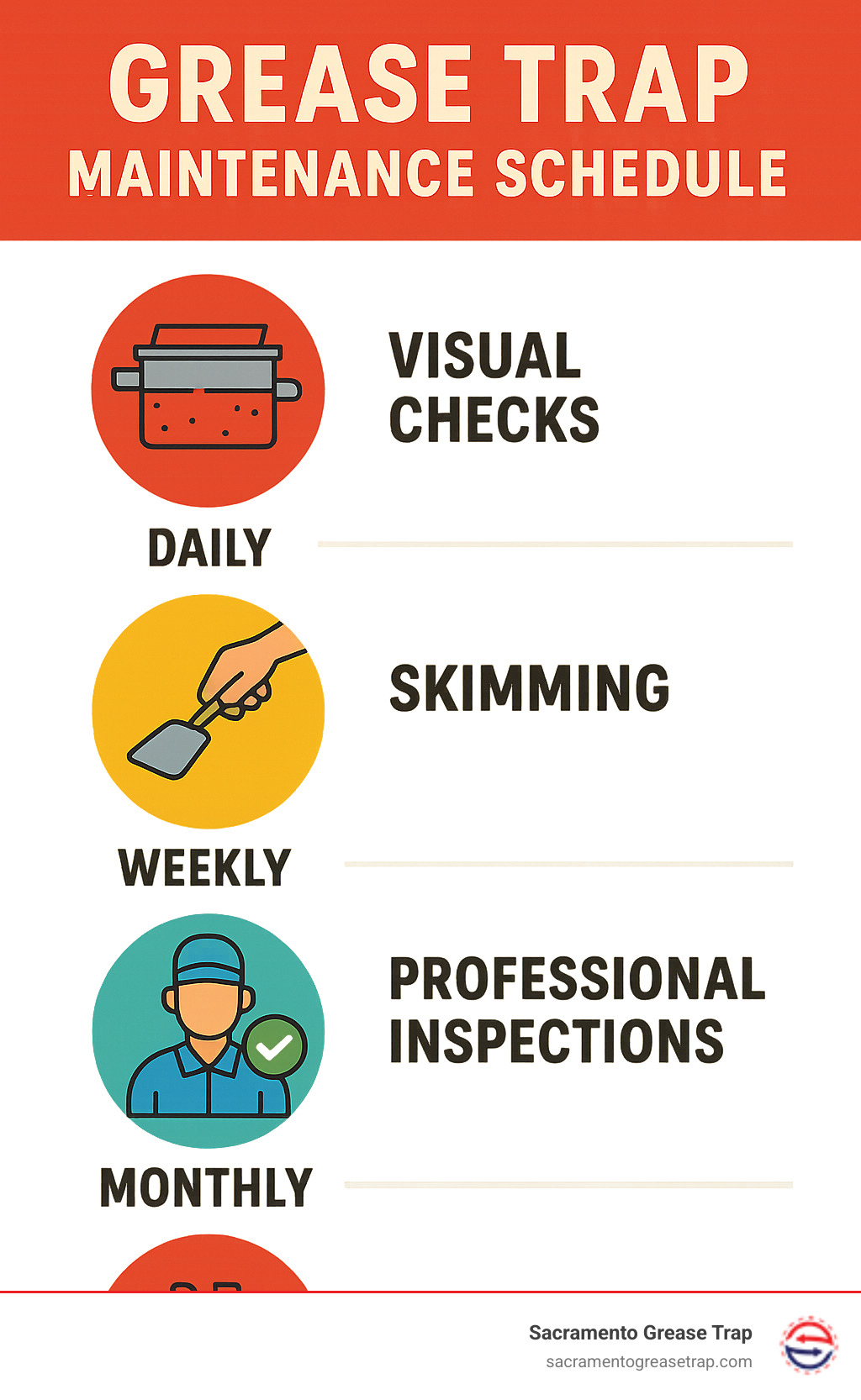
Choosing the Right Grease Trap Pumping Partner
Finding the perfect partner for grease trap pumping sacramento services isn't just about the lowest price - it's about building a relationship that keeps your business compliant, profitable, and stress-free.
Certifications and insurance should be your first checkpoint. Any legitimate service provider needs proper licensing from California authorities and comprehensive insurance coverage for waste handling operations.
24/7 emergency response can literally save your business. Picture this: it's Saturday night, your dining room is packed, and suddenly your kitchen starts backing up with greasy sewage. The company that answers their phone at 9 PM and shows up within the hour is worth their weight in gold.
Transparent pricing eliminates those heart-stopping moments when you get the bill. Professional companies provide detailed estimates upfront and explain any potential additional charges before they start work.
Eco-friendly disposal practices matter more than you might think. Sacramento takes environmental responsibility seriously, and partnering with companies that recycle waste into renewable energy protects you from future liability.
Digital reporting transforms compliance from a headache into a simple click. Modern service providers offer online portals where you can access service records, schedule appointments, and track your compliance status.
Don't skip checking references from similar businesses in Sacramento. For deeper background on why proper grease management matters, check out the scientific research on grease management that explains the principles behind these systems.
Questions to Ask Before You Sign a Contract
Start with frequency guarantees - will they adjust your service schedule based on actual trap conditions, or are you locked into rigid monthly visits regardless of need? The best providers use the 25% capacity rule to determine when you actually need service.
Emergency fees can make or break your budget during a crisis. Get crystal clear on what constitutes an emergency call and exactly what additional charges apply.
Compliance support separates the pros from the amateurs. Does your potential provider help with record-keeping, inspector relations, and staying current with changing regulations?
Disposal receipts and manifest documentation aren't just paperwork - they're your protection from environmental liability.
Red Flags & Money-Saving Tips
Watch out for companies pushing oversized services or unnecessarily frequent pumping schedules. Your pumping frequency should be based on actual F.O.G. levels and trap capacity, not someone's desire to visit your restaurant every week.
Hidden surcharges for basic services scream unprofessional operation. Legitimate companies include standard services like measurement, complete pumping, and basic cleaning in their base price.
Here's a money-saving insider tip: bundled maintenance discounts often provide significant value for Sacramento businesses. Companies offering combined services - pumping, cleaning, oil recycling, and minor repairs - typically beat piecemeal providers on both price and convenience.
Be suspicious of extremely low prices - they usually indicate corner-cutting on disposal, insurance, or service quality. Focus on value: reliable service, proper disposal, complete compliance support, and responsive customer service.
Frequently Asked Questions About Grease Trap Service in Sacramento
When you're running a busy Sacramento kitchen, questions about grease trap pumping sacramento requirements come up all the time. Let's clear up the most common concerns we hear from local business owners.
Do I need permits for each pumping visit?
You don't need to pull permits every time we show up to pump your grease trap. What you do need is proper permits for your grease trap installation and operation. Sacramento County requires all food service establishments to have approved grease management systems in place, but once that's handled, routine maintenance is just routine.
The important part is making sure your service provider is properly licensed for waste hauling and disposal. Licensed companies handle all the necessary paperwork for transporting and disposing of waste at approved facilities.
How do inspectors verify my maintenance logs?
Health department inspectors review your maintenance logs showing pumping dates, service provider information, and any issues noted during service calls. They also want to see disposal manifests proving your waste went to licensed facilities.
Many inspectors will actually measure current F.O.G. levels in your trap to verify you're not exceeding that critical 25% capacity rule. Some also check for proper signage, evidence of staff training, and signs that you're doing daily maintenance.
We provide digital record-keeping that makes inspector reviews smooth and professional. When everything's organized and easily accessible, inspectors can do their job quickly and you can get back to serving customers.
Can additives replace regular pumping?
The answer is absolutely not. While enzyme additives and bacterial treatments can help break down organic matter between pumpings, they simply cannot replace professional service. Commercial kitchens generate way too much F.O.G. for biological treatments to handle completely.
Additives work best as supplements to regular pumping schedules. They can help extend time between services slightly and reduce odors, but they don't eliminate the need for physically removing accumulated grease and solids.
Be especially careful of companies claiming their products eliminate pumping needs entirely. These claims ignore basic physics - grease must be physically removed from traps, period. Plus, regulatory agencies require physical pumping regardless of what additives you use.
Conclusion
Running a successful restaurant in Sacramento means staying on top of every detail - and grease trap pumping sacramento maintenance is one detail that can make or break your business. It's not just about following rules (though those matter too). It's about protecting your investment, your reputation, and the community we all share.
After three decades of helping Sacramento, Auburn, Elk Grove, and Roseville businesses keep their kitchens running smoothly, we've learned that the best approach combines smart business practices with genuine environmental care. When you work with Sacramento Grease Trap, you're not just getting a service - you're getting a partner who understands the local regulations, respects your time, and shares your commitment to doing things right.
Preventive maintenance isn't an expense - it's insurance. The few hundred dollars you spend on regular pumping can save you thousands in emergency repairs, fines, and lost business. We've seen too many restaurant owners learn this lesson the hard way, dealing with backed-up kitchens during their busiest nights or facing closure orders that could have been easily prevented.
Our eco-friendly approach means your waste gets handled responsibly, often converted into renewable energy that benefits our entire region. Our digital reporting takes the headache out of compliance documentation, and our 24/7 emergency response means you'll never face a grease trap disaster alone.
The math is simple, but the peace of mind is priceless. Regular professional service protects your business from the kind of messy, expensive surprises that can devastate a food service operation. Smart Sacramento business owners know that reliable grease trap maintenance is as essential as keeping their refrigerators running and their staff trained.
Ready to protect your business and join the thousands of local establishments who trust us? Contact Sacramento Grease Trap today to schedule your service. Your customers will never notice perfect grease trap maintenance - and that's exactly how it should be.
For budget-conscious business owners looking to maximize value, our Affordable Grease Pumping guide shows how proper planning reduces costs while keeping you fully compliant with local regulations.

Let Us Simplify Your Grease Trap Maintenance.
Proper grease trap maintenance will reduce costly repairs in the future.
.avif)
